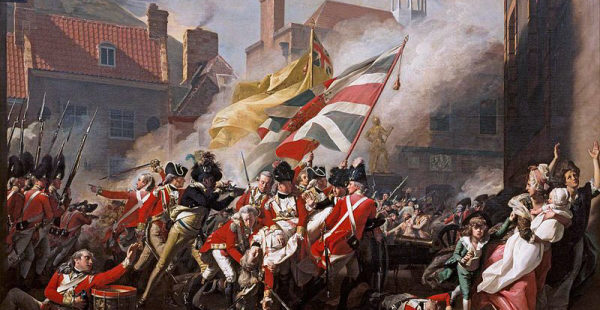
The Eighteenth Century: Great Britain
The eighteenth century was a golden age in the history of Great Britain: a flowering of music, literature, philosophy, and religion. Today we will take a short chronological ‘tour’ through this land. This is not a comprehensive survey, but it will provide a few of the more important people, events, and ideas that dominated this land and time.
This is part of series on the eighteenth century. You can also view the Tides of History, the Great Events, and America.
As mentioned last week, the Glorious Revolution (1688) began the ‘long’ eighteenth century. The pro-Catholic House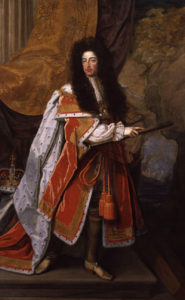 of Stuart was overthrown in a nearly bloodless coup by William, Prince of Orange. The Edict of Toleration of 1689 provided for increased religious freedom for Protestant dissenters, and certain rights for the people were guaranteed in the Bill of Rights of 1689. As a result, the French nation became the allies of the disinherited Stuarts, and they would attempt, more than once, to regain control of the nation during the eighteenth century.
of Stuart was overthrown in a nearly bloodless coup by William, Prince of Orange. The Edict of Toleration of 1689 provided for increased religious freedom for Protestant dissenters, and certain rights for the people were guaranteed in the Bill of Rights of 1689. As a result, the French nation became the allies of the disinherited Stuarts, and they would attempt, more than once, to regain control of the nation during the eighteenth century.
Another monumental change in British history occurred in 1707, at the Treaty of Union. For centuries, the Kingdoms of England and Scotland had remained separate political entities. Edward I and Edward III, during the turbulent Middle Ages, had attempted to enforce English domination over the Scots, but this was mostly unsuccessful. It was not until James I (1566-1625), one of the Stuarts, that the two kingdoms were ruled by the same monarch (James inherited the crowns of both kingdoms). Still, they were separate kingdoms, even while ruled by the same man. In 1707, the legislative bodies of both kingdoms voted to unite into the ‘United Kingdom of Great Britain.’ While this was deeply unpopular in Scotland, and while it remains a divisive topic, the Scots and English remain united to the present day.
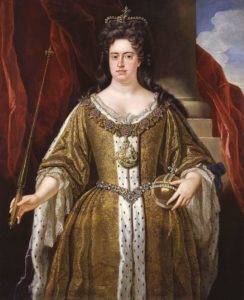 Following the reigns of William and Mary, Queen Anne (1665-1714) reigned from 1702 to 1714. While she had Stuart blood, she was raised as an Anglican. She was succeeded by George I (1660-1727; reigned 1714-1727), the first British monarch from the House of Hanover. The Hanoverian Dynasty continued in power until 1901; it gained its name from ancestral holdings in Hanover, modern day Germany. At that time, Hanover was part of the Holy Roman Empire, and the Hanoverian holdings gave the British monarchs a say in the election of each Holy Roman Emperor. This became one of the reasons why Britain was drawn into so much European conflict. George I, meanwhile, inherited the throne after Queen Anne, not because he was her closest relative, but because he was the closest non-Catholic relative – meaning that scores of potential inheritors were passed over.
Following the reigns of William and Mary, Queen Anne (1665-1714) reigned from 1702 to 1714. While she had Stuart blood, she was raised as an Anglican. She was succeeded by George I (1660-1727; reigned 1714-1727), the first British monarch from the House of Hanover. The Hanoverian Dynasty continued in power until 1901; it gained its name from ancestral holdings in Hanover, modern day Germany. At that time, Hanover was part of the Holy Roman Empire, and the Hanoverian holdings gave the British monarchs a say in the election of each Holy Roman Emperor. This became one of the reasons why Britain was drawn into so much European conflict. George I, meanwhile, inherited the throne after Queen Anne, not because he was her closest relative, but because he was the closest non-Catholic relative – meaning that scores of potential inheritors were passed over.
At the outset of his reign, in 1715, the Hanoverian Dynasty was threatened with an overthrow when James Francis Edward Stuart – the ‘Old Pretender’ – attempted to reclaim the throne for the Stuarts. He sailed from France to Scotland, the home of many Stuart sympathizers, but he was defeated and the Hanoverians remained in power.
As British society moved from the traditional emphasis on King versus Parliament, a new division emerged: the Tories versus the Whigs. Generally speaking, the Tories were supporters of the monarchy (traditionally they supported the Stuart kings), supporters of the state church (Anglicanism), and they found their base of support in the merchants, country gentry, and official administrators. The Whigs, on the other hand, were the traditional supporters of Parliament. They supported dissenters from the state church, and they were opposed to the Stuarts. The Whigs were involved in promoting the Glorious Revolution, and they found their support in the landed aristocracy. (Because of their support for dissenters and their more strongly Protestant base, they were sometimes referred to as the ‘We Hope In God’ WHIG party).
As these two political parties battled for control of the Parliament, the Tories remained influential during the reign of Queen Anne, but they lost significant power during the reign of George I. From that point, the Tory party essentially fall apart; it was not until William Pitt became Prime Minister that the Tories regained control – but by then it was a reformed party, no longer focused on the Stuart monarchy, but rather on social reform and economic industrialization.
Significant in this history is Robert Walpole (1676-1745), the first ‘de facto’ prime minister of Britain and a hugely influential member of the government. Since he held power between 1721-1742, he was the most notable of Whig politicians during this time.
George II (1683-1760) succeeded his father and reigned from 1727-1760. He was the last British monarch born outside Britain, in the Hanoverian holdings on the Continent. He was also the last British monarch to personally direct an army into battle, which he did at the Battle of Dettingen during the War of the Austrian Succession.
During George II’s reign, the Great Awakening (known as the Evangelical Revival in Great Britain) had a profound effect on the religious sentiments of the British people. Deism held sway over many Britons. “It taught that whatever God there may be is nothing more than the First Cause, a force that made the world the way a clock-maker makes a clock, and having set its mechanism to operate according to certain laws, simply winds it up and lets it run” (Dallimore). There was also a fear of over-zealous religion; had not the horrific Thirty Years War of the previous century been caused by over-zealous Protestants and Catholics? Hence, anyone who believed with too much fervency, or who aimed to live out Biblical teaching too radically, was in danger of being termed an ‘enthusiast’ – which, at this time, was not a compliment.
The three most significant individuals, whose names are most connected with the Great Awakening, are the Wesley brothers and George Whitefield. The story of the Wesley brothers must go back to Susanna Wesley (1669-1742), an extraordinary woman by any account. Not only did she birth nineteen children during her life (many of whom died before her), but she also trained them exceptionally and prepared both John and Charles for the remarkable influence that they would have in life.
John (1703-1791) and Charles (1707-1788) were involved in the influential ‘Holy Club,’ a society of students that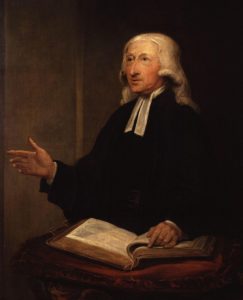 aimed for holiness of life, and which George Whitefield was also involved in. Despite their seeming piety, it was not until John sailed for the colony of Georgia, as a minister, that he came face to face with his own powerless faith. Seeing a group of Moravians (a German denomination) who were singing hymns in the middle of a terrifying storm, John realized that his afraid of dying at sea. Later he was asked “Do you know Jesus Christ?” and he recognized his lack of certainty. John went on to preach to tens of thousands in both Britain and America, as did George Whitefield, who also spent time in Georgia.
aimed for holiness of life, and which George Whitefield was also involved in. Despite their seeming piety, it was not until John sailed for the colony of Georgia, as a minister, that he came face to face with his own powerless faith. Seeing a group of Moravians (a German denomination) who were singing hymns in the middle of a terrifying storm, John realized that his afraid of dying at sea. Later he was asked “Do you know Jesus Christ?” and he recognized his lack of certainty. John went on to preach to tens of thousands in both Britain and America, as did George Whitefield, who also spent time in Georgia.
Both Whitefield and Wesley spread the message of the ‘new birth’ and it is estimated that millions, maybe even ten million, heard their preaching. Charles was also famous, especially for his many hymns that are still sung (including “And Can It Be,” “Hark the Herald Angels Sing,” and “O For a Thousand Tongues to Sing”). While all three men remained in the Anglican church, Whitefield held to the Calvinistic tenor of the “39 Articles,” while the Wesleys held to certain Arminian views and believed in the possibility of Sinless Perfection. While the trio of evangelists added church members to many different denominations, they were especially associated with ‘methodism,’ a denomination which gained its title because of the careful and ‘methodical’ way in which early Methodists pursued holiness.
Another outbreak of internal unrest occurred during the Jacobite Rising of 1745. Charles Edward Stuart – the ‘Young Pretender’ – still desired to regain the crown for the Stuarts. Aided by the French, he sailed to Scotland and gained a  following of Scottish highland tribes that remained pro-Catholic and pro-Stuart. His initial campaign had some success, capturing Edinburgh and marching south toward London. When promised support failed to materialize, Charles was forced to turn around, and he was defeated in northern Scotland at the Battle of Culloden. From then on, Scottish nationalism was repressed with greater vigor.
following of Scottish highland tribes that remained pro-Catholic and pro-Stuart. His initial campaign had some success, capturing Edinburgh and marching south toward London. When promised support failed to materialize, Charles was forced to turn around, and he was defeated in northern Scotland at the Battle of Culloden. From then on, Scottish nationalism was repressed with greater vigor.
This was also a time of artistic flowering. George Frideric Handel (1685-1759) was a London-based composer. His most famous work, the oratorio “Messiah” premiered in 1742; he also wrote the “Coronation Anthems” that were played at the coronations of English kings and queens. Alexander Pope (1688-1744) is considered the greatest poet of the eighteenth century, and his genius for rhyme was discovered at a young age. This was a time of great interest in antiquity, and hence the ‘Augustan’ form of literature and art arose. Such a form emphasized ancient Greek and Roman styles, including the noble, the heroic, and the grandiose.
As already mentioned, the Seven Years War was the most deadly war of the true eighteenth century. In addition to  Europe, it involved strife in India, where British forces defeated French and Mughal armies during the Carnatic Wars. In fact, the British East India Company was a privately-held company that hired its own private army; at one point, it was estimated, the British East India Company army was twice the size of the official British Army. Robert Clive (1725-1774) was a significant figure in the company, and he used his influence both to enlarge the company and to pocket a massive fortune.
Europe, it involved strife in India, where British forces defeated French and Mughal armies during the Carnatic Wars. In fact, the British East India Company was a privately-held company that hired its own private army; at one point, it was estimated, the British East India Company army was twice the size of the official British Army. Robert Clive (1725-1774) was a significant figure in the company, and he used his influence both to enlarge the company and to pocket a massive fortune.
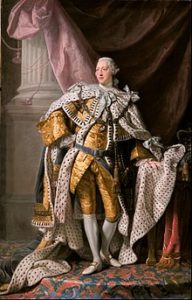 George III (1738-1820) reigned from 1760-1820; he was the grandson of George II. By this point, the monarch had considerably less power than at previous times, while the Prime Ministers held significantly more. Historians disagree on how to view George, but he was nearly incapacitated by mental illness during the later part of his reign.
George III (1738-1820) reigned from 1760-1820; he was the grandson of George II. By this point, the monarch had considerably less power than at previous times, while the Prime Ministers held significantly more. Historians disagree on how to view George, but he was nearly incapacitated by mental illness during the later part of his reign.
The year 1776 was an important year for literature. Edward Gibbon (1737-1794) published his first work on the “History of the Decline and Fall of the Roman Empire,” a massive history of Ancient Rome that was strongly tinged with Deism. This was a time when the subject of statecraft was debated and studied with great diligence; the question of what makes for a stable and just government was important for many intellectuals, and Gibbon’s history was became source material in trying to understand the good and evil of the Roman government.
It was also in 1776 that Adam Smith published his magnum opus “An Inquiry into the Nature and Causes of the Wealth of Nations.” Smith was a Scottish economist and philosopher who aimed to understand how countries gain wealth; his research indicated that prosperity increases as individuals have the freedom to make choices that benefit themselves. Hence, free markets, rather than tariffs, lead to mutually advantageous wealth.
William Pitt the Younger (1759-1806) was the most famous Prime Minister of the time, gaining that influential post at the young age of 24; he remained in the office until 1806, except for a short break from 1801-1804. Pitt was brilliant,
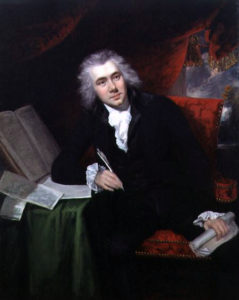
a guiding hand during the turbulent period of the French Revolution and Napoleonic Wars. He was also the friend of William Wilberforce (1759-1833), a Minister of Parliament and an evangelical Christian. Wilberforce advocated the abolition of slavery; the Slave Trade Act of 1807 led to the abolition of the slave trade, and the Slavery Abolition Act of 1833 ended all slavery in British territory. Wilberforce was also influential in many other social reformations, such as the prevention of animal cruelty and the opening of India to Christian missionaries. He was guided in part by John Newton (1725-1807), the former captain of a slave ship who later wrote “Amazing Grace.”
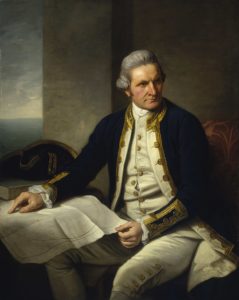 The most famous navigator of the empire, however, was Captain James Cook (1728-1779) who travelled through the Pacific Ocean, mapping New Zealand and other remote regions. He eventually met his demise in the Sandwich Islands, later Hawaii, in a dispute with the natives.
The most famous navigator of the empire, however, was Captain James Cook (1728-1779) who travelled through the Pacific Ocean, mapping New Zealand and other remote regions. He eventually met his demise in the Sandwich Islands, later Hawaii, in a dispute with the natives.
In the later half of the eighteenth century, Andrew Fuller (1754-1815) was a Particular Baptist theologian who wrote “The Gospel Worthy of All Acceptation” (1785). This important work argued against hyper-Calvinism and influenced William Carey (1761-1834) to leave his work as a shoemaker to take the gospel to India. Carey was already interested in geography, and he advocated missions in “An Enquiry into the Obligations of Christians to Use Means for the Conversion of the Heathen.” While Carey met opposition from his fellow-believers, he eventually moved to India, faced difficulties with the hostile British East India Company, and settled in Serampore, where he translated the Bible into numerous Asian tongues.
The era closes with the Napoleonic Wars. Perhaps the greatest hero of this conflict was Horatio Nelson (1758-1805), a vice-admiral of the British Navy who died in the Battle of Trafalgar. Nelson was influential in the British victory at the Battle of the Nile, though he lost his right arm in combat. His message from his flagship, just before his own death at the battle of Trafalgar, stated “England expects that every man will do his duty.”



